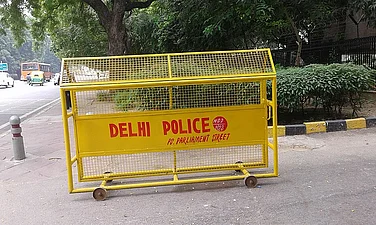The upcoming shift of India's lawmakers to the new Parliament building brings with it a range of noteworthy features, as per report by NDTV. Among these features is an "automated system" designed to deactivate a Member of Parliament's microphone once their allotted speaking time has concluded. Additionally, the new Parliament incorporates a biometric security system and a more compact chamber, referred to as the Well, aimed at reducing the potential for protests by opposition lawmakers, according to the same sources.
Furthermore, the new Parliament will adopt a "paperless" approach, with each MP being provided with a tablet computer. There will also be stricter entry requirements for journalists. Notably, the building features six gates, each named after creatures, some real and some from mythology. These include names like the elephant and Garuda, the eagle that serves as Vishnu's mount.
The introduction of the "automated system" coincides with ongoing allegations that the government has been silencing opposition MPs by cutting off their microphones. These allegations came to the forefront during the previous parliamentary session last month when the opposition was pressing for a parliamentary inquiry into the Hindenburg report, which accused the Adani Group of financial wrongdoing.
Mallikarjun Kharge, who serves as the leader of the Opposition in the Rajya Sabha and is also the head of the Congress party, emphasized this point and accused the government of disrespecting him. In response, the ruling Bharatiya Janata Party (BJP) refuted the accusation and attributed the issue to a "technical fault." A video shared by the Congress revealed a lack of functioning microphones for nearly 20 minutes, and normal microphone operation was only restored when Speaker Om Birla called on MPs to maintain order and decorum. Additionally, sources indicated that the BJP had decided that Congress MP Rahul Gandhi would not be allowed to speak until he apologized for certain remarks made in London.
Back in March, Mr. Gandhi alleged that functional microphones were frequently disabled when opposition leaders attempted to speak. He stated, "Our mikes are not out of order... they are functioning but you still can't switch them on. That has happened to me a number of times," during an event in London.
This morning, Prime Minister Narendra Modi inaugurated a five-day special session of Parliament with a speech that lasted 51 minutes. During his speech, he alternated between criticism of the opposition and praise for his government. He also mentioned significant events such as the G20 summit and the Chandrayaan-3 Moon mission. In his extensive address, which included several jabs at the opposition, including a reference to the 'cash for votes' scandal during the Manmohan Singh government, the Prime Minister also recalled "bitter-sweet memories" associated with the old Parliament building, including the 2001 terrorist attack.
Parliament is scheduled to move to the new building following the lunch break on Tuesday. However, a potentially contentious first day appears unlikely as the bill amending the terms of appointment for the Chief Election Commissioner and Election Commissioners has been withdrawn, at least for the time being. Although this bill was initially slated for consideration in the special session, the government has decided to pull it back. Sources have indicated that amendments are being contemplated for a bill that would lower the status of the Chief Election Commissioner and his panel members from being equivalent to Supreme Court judges to that of a cabinet secretary. Nevertheless, there are still eight other bills listed for consideration.
Inputs from NDTV.




















.png?w=200&auto=format%2Ccompress&fit=max)





